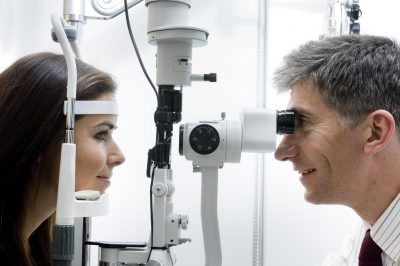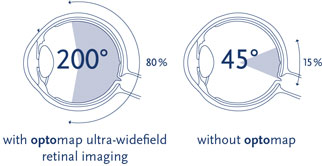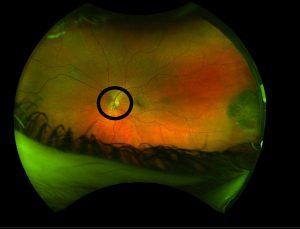Eye Examinations

Regular Examinations
A regular eye examination is an important part of a healthy lifestyle. Our thorough eye examinations include 40 minutes with the optometrist to fully assess your eyesight and any requirement for vision correction, plus give advice and check for signs and symptoms of more serious eye problems. Using the latest technology in optometric equipment, including OCT and wide field digital imaging of the retina, our optometrists are able to comprehensively examine the eye for signs of disease or abnormality.
Advanced Eye Imaging
The Advanced Eye Imaging appointment is part of our Private Eye Examination or available for a supplementary fee for NHS Sight Test patients.
We use two state of the art devices to view and analyse the retina (the important back surface of the eye that interprets the world):
Ocular Coherence Tomography (OCT)
OCT uses light ‘like an ultrasound’ to image what is going on underneath the retina and optic nerve. This is important because that is where earliest key changes of such conditions as macular degeneration and glaucoma can occur. Earlier detection of such conditions allow better treatment and the best chance of avoiding damage to your vision.
Optomap
The Optomap is a wide field scanning laser ophthalmoscope that allows a view of the far periphery of the retina. This is invaluable in detecting defects such as retinal tears and detachments.

Don’t forget that optometrists aren’t just qualified for vision problems. Whether you have a red eye or symptoms of itchiness or pain to the eye, your optometrist is well placed to manage and often treat these conditions.
Important: : If you have a sudden change in vision or an acute problem with your eye and need to be seen soon, please see our MECS page for details. Alternatively, the Oxford Eye Hospital eye emergency number is: 01865 234567.
Common conditions that we look for in an eye examination:
Eye Examinations and Children
Regular eye care is important for all children. It is not difficult for you to look after your child’s eyes.
Some facts you might not know about children’s vision:
- Children need a clear focussed image in both eyes if their sight is to develop normally.
- About 2-3% of all children have a “lazy eye”, or amblyopia.
- The sooner the child is treated, the better the prospects are for normal vision.
- Short-sightedness (or myopia) is becoming more common and although a previous eye examination may have concluded that your child did not need spectacles, this situation could change.
Common ‘Myths’:
- Wearing glasses will make your eyes worse – Wearing spectacles simply helps you to see clearly and comfortably.
- Children’s glasses have to be ‘NHS’ – NHS spectacles no longer exist. The NHS instead pays a contribution towards the cost of any spectacles.
- My child can see, so I know she/he is all right – Children may not notice that they have vision that is worse in one eye than the other and even if they do notice, they may assume it is normal. After all they can write better with one hand than the other, so it is not unreasonable for them to assume that they should be able to see better with one eye than the other.
It is Particulary Important for You to Have Your Child’s Eyes Examined If:
- If people in the family needed spectacles when they were young
- There is a history of a squint or lazy eye in your child’s family
- Your child has special needs, as these children are particularly prone to eye problems
Signs to Look Out For:
- One eye turns in or out, this may be more noticeable when tired
- Frequent rubbing of the eyes
- Watery eyes
- Clumsiness
- Avoidance of reading, writing or drawing
- Screwing up eyes or frowning when reading or watching TV
- Behavioural or concentration problems at school
- Progress at school not as expected
- Complaints of blurred or double vision, or unexplained headaches
What You Can Do:
- Take your child for regular eye examinations by an optometrist (ophthalmic optician). Children do not have to be able to read to have their eyes examined. Optometrists can use picture charts instead of letter charts to check your child’s vision, and tell whether they need spectacles by simply shining a light into their eye. This is particularly important if there is a history of squints or lazy eyes in your family. The Optometrist will also examine the health of children’s eyes, inside and out.
- You don’t have to pay for your child’s NHS sight test.
- Ask your family or friends which optometrist they would recommend. Look in the Yellow Pages (under Opticians – Ophthalmic). Telephone NHS direct (0845 4647). Look on www.nhs.uk and click on ‘more options’ or www.nhsdirect.nhs.uk and click on ‘Find a local health service’.



